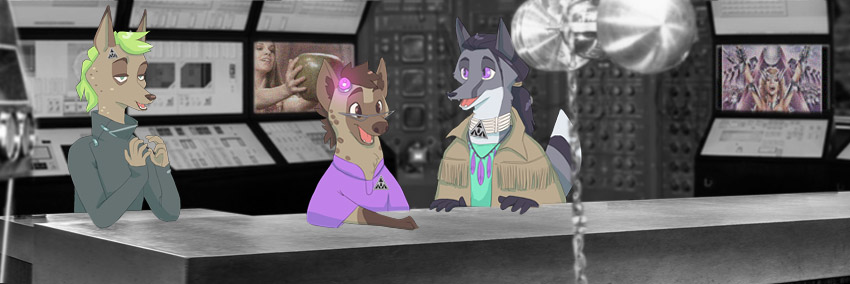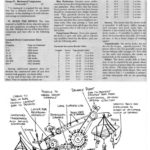Deimos! Because nature adores a vacuum!
Episode 16: Proficiency Check! Join us for a long chat about skills in the Ic Svnt Dracones game.
Wrapping up our plot arch on character generation with one final coherent episode, this time on skills and focus abilities (next chargen episode will be about “everything else,” and will be entirely incoherent.)
♃ 0.20 — A quick announcement before the episode begins. In E15 we talked a bit about the March 7 HSD tumblr post, which looked at the Table of Contents for the upcoming lorebook. This week a new tumblr post went up with a revised TOC with more details and better notes on the book’s structure. Check it out!
♃ 2.06 — finally, a topic! The hosts chew on proficiencies.
♃ 2.46 — charts and graphs! Once again we refer you to our post about the exciting world of dice mechanics and probabilities. The odds of success on a roll of 1d8+Proficiency, since I mentioned it but didn’t really continue the thought, are (At each level of proficiency, from 0 to 4): 0: 12.3% – 1: 26.5% – 2: 40.5% – 3: 46.9% – 4: 62.7%
♃ 5.40 — Game lore and learning: In infancy, a lot of vector learning is given to them in whatever strange infant tanks vectors spend the first 6 months to a year of their life in (much longer and they get “overbaked,” and turn out a little weird). After that, they go to school like normal folks. But at the PC level of development, vectors use something called a “neuroplex,” which is an implant that replaces or enhances one of the vector’s eyes and, as needed, replaces their dreaming sleep cycle with commercially available learning programs. This largely replaced standard character learning times in the original HSD book, tying learning and purchasing power together. Exended had some material that offset this.
♃ 6.21 — On the high cost of education: A neuroplex unit costs ₢100, and can’t be shared with your friends. For comparison, your typical hacker’s laptop costs ₢20, a luxury vehicle costs ₢200, and most firearms run about ₢50-70. So it’s not a small investment, and tricking out the party with them, even moreso. So it’s not really an option for beginning characters.
♃ 7.10 — Star Trek’s licence was held briefly by Last Unicorn Games (not “White Unicorn”, and they had the multi-stage character generation rules. Nicely handled, too, very good way to build character and stats at the same time.
GURPS Goblins is set in 1830 England, and it has a delightfully perverse character generation system, where the abuses you receive shape the character you become. It’s a lot of fun to read, a perverse send-off of pre-victorian England. Here’s a few abuses that might have made your formless lump of suet the proud goblin he is today.
♃ 14.30 — Insert proficiency-by-corp chart here…

♃ 15.57 — Bless you, ants. Blants.
♃ 26.23 — Just in case we hadn’t wasted enough time on the monumental film “The Apple,”
Which along with Xanadu and You Can’t Stop the Music is one of the three movies that killed Disco, I dropped the “play the red tape” bit into the podcast. No, you can’t find this clip on YouTube. Life’s not fair, is it.
♃ 39.49 — The 1st edition D&D Book “Dragonlance Adventures” had a strange branching diagram for building tinker gnome inventions, and I thought this was somehow relevant to the discussion but for the life of me I can’t remember why now. Here for your moral betterment is the excerpt from that section.
♃ 39.49 — The 1st edition D&D Book “Dragonlance Adventures” had a strange branching diagram for building tinker gnome inventions, and I thought this was somehow relevant to the discussion but for the life of me I can’t remember why now. Here for your moral betterment is the excerpt from that section.
♃ 52.54 —one of the common approaches to HSD game balance is the network of derived stats and somewhat non-intuitive limitations. Mind:Presence is kind of a hard stat to find a use for, so it plays a role in the morale-like “Nerve” derived stat. You effectively get a slot for a potential Focus Ability every time you buy up a proficiency to Masterful or Preeminent, both of which are limited by your Mind:Strength. The total number of Focus Abilities you can pick up is Mind:Strength x3 (because buying a skill from 2 to 3, and then 3 to 4, gives you a new slot for a level 3 skill.) (HSD1.0p.278-279)
♃ 1.05.38 I think I spend most of my time on these show notes explicating Whines’s in-jokes… Please see the LMAO King 2, which is probably the most fun you can have watching the Lion King 2.
With thanks to Sirius Beat for our intro music, “Future Club,” and outro music, “Tronicles.” Our fun, modular header art is by Absyfield , (Thank you Ashley!) and Whines is our audio engineer.
Podcast: Play in new window | Download
Subscribe: RSS





You mention games that incorporate the character’s background into their character sheet. Brought to mind Traveller’s “lifepath” system, in that one most of your skills, starting gear, and a few other random traits, are determined by rolling on tables organized by whatever jobs you used to have. In the first edition you could die before you even had the chance to play.
Unfortunately, since ship prices are measured in megacredits, necessitation a mortgage with monthly payments, playing Traveller often seems like accounting.
I recall Traveller having something like that (and that it was theoretically possible to die before the game began…) that was mentioned in the old “Murphy’s Rules” book by Steve Jackson Games, a compendium of bizaare rules and more than a little gamer humor…though when I was talking about it, I couldn’t quite remember that one. It was I think one of the first, if not the first, of these staged character creation methods. I like that idea a lot.